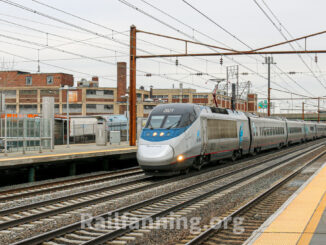
Amtrak’s $227 million operating loss in Fiscal Year is the railroad’s lowest since 1973, the railroad said.
The passenger railroad covered 93 percent of its operating costs, up from 89 percent a year earlier. The improved financial results is a sign that Amtrak is on the right track, officials contend.
FY2014 marked the fifth consecutive year of revenue growth. And, the railroad has reported revenue growth in eight of the last nine years, according to numbers it released..
“Our financial performance over the past year is the clearest indication yet that Amtrak’s investments, operating efficiencies and focus on its customers is paying off,” Amtrak Chairman of the Board Tony Coscia said in a news release.
“Under the leadership of Amtrak’s Board and management, the company is transforming how it does business,” Coscia added. “We are delighted with our latest financial results and committed to making further progress in the years ahead. As we continue to make improvements in our operating and financial performance, we call upon the federal government and our stakeholders to support the capital investments necessary to keep moving Amtrak forward.”
Amtrak also reported a ridership increase in 2014.
The number of people who took Amtrak in Fiscal Year 2014 increased 0.2 percent from a year earlier while ticket revenues increased 4 percent, the railroad said. More than 30.9 million people took an Amtrak train during the fiscal year, up from 30.8 million a year earlier.
Amtrak last year reported a ridership record of 31.6 million passengers, but revised its numbers to more accurately count ridership of multi-ride tickets, the railroad said.
Amtrak saw the biggest ridership increase on the Northeast Corridor where the number of passengers increased by 3.3 percent. The railroad saw a 4.5 percent decrease on its national network, according to numbers.
“As more and more people choose Amtrak for their travel needs, investments must be made in the tracks, tunnels, bridges and other infrastructure used by intercity passenger trains particularly on the Northeast Corridor and in Chicago,” Amtrak President and CEO Joe Boardman said in a news release. “Otherwise, we face a future with increased infrastructure-related service disruptions and delays that will hurt local and regional economies and drive passengers away.”




